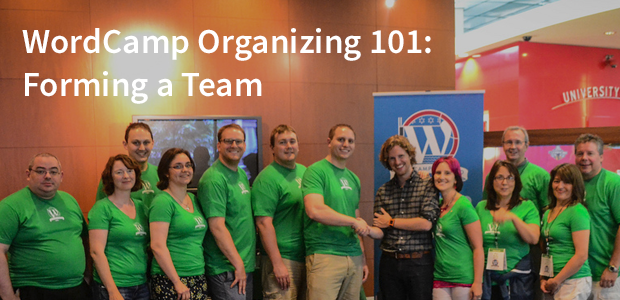
We kicked off the WordCamp Organizing 101 series with a high-level introduction to organizing WordCamps.
In this post I’ll be sharing some advice and experiences about forming a WordCamp organizing team.
From the WordCamp Planning site:
The first step once you’ve been approved as a primary organizer is to put together an organizing team. This team should consist of 5-10 people from your immediate area who want to promote WordPress and help grow the local community. Out-of-town friends do not belong on your organizing team; though you are free to solicit advice from people anywhere, the actual organizing team should be local.
And their tl;dr:
Recruit a local organizing team and distribute responsibilities. Too few people handling too many things means stuff gets missed or people get grouchy.
Let’s start off with some general points. 🙂
Advice for Organizing a WordCamp Team
Keep it local. In our kickoff post I stressed the importance of face-to-face meetings. Text doesn’t do the job, and neither does voice. You need the personal interaction, especially when things get stressful. It’s too easy to be misinterpreted otherwise. Keeping the team local makes it far easier to arrange in-person meetings.
Bigger doesn’t always mean better. The more people you have on your team, the more schedules and availabilities you need to juggle. There were three of us for 2011 and 2012, and 2013 ended up with four organizers in the end. While this meant more duties for each person, the small size of our team meant we spent less time making decisions. We were agile.
Form a team with people who can work together. Clashing personalities or working styles will cause problems down the road, especially when stress is added to the mix. Unnecessary drama and politics will cripple you. A small team that can effortlessly work together will have a better time than a large team that constantly clashes.
Don’t be too ambitious. Creativity is great, but audacious planning can add a lot of complexity to an event. Don’t get carried away. If this is your first time, focus on getting the basics nailed down first. Get fancy when your essentials are out of the way. (e.g. I wanted to do a logo contest in 2013, but finally caved after one of our co-organizers asked if it was really a priority over other tasks.)
Use a task list so things don’t get missed. Keep people accountable by listing all your to-do items in one spot and assigning them to team members. With weekly check-ins (described below) you’re more likely to stay on-task and get things done.
Stay flexible. Things change in the 5-8 months it takes to prepare a WordCamp. Availabilities will be shuffled around; emergencies will come up; opinions may shift through discussions and reconsiderations. But time isn’t going to stop for anyone. Decisions won’t, and shouldn’t, be put on hold just because one person is on vacation.
Roles & Areas of Responsibility
The organizer’s guide outlines 16 areas of responsibility that should be assigned:
- Venue logistics (including insurance)
- Fundraising
- Budget/money handling
- Food/beverage
- Swag
- Volunteer wrangling
- Printing
- Design (web, programs, shirts, signs, screensaver)
- Website maintenance
- Publicity
- A/V
- Speaker selection, schedule
- Afterparty
- Speakers’ dinner/reception
- Beginner courses
- Transportation and travel details
We’ve worked with a slightly different setup, grouping related responsibilities into different roles. This made it possible for us to operate as a smaller team. If you have more organizers, these roles can be broken up so each person has less of a workload:
1. Shared Responsibilities
These are typically one-off tasks. They can be taken on by anyone in the organizing team who has the right connections/experience. You can also bring in volunteers to handle tasks that can be “outsourced”, like design. (Keep it local, though!)
If you’re organizing a meetup, you can also source ideas and connections for some of these tasks from your meetup group members.
- Venue Logistics
- Fundraising, Sponsors
- Speaker Selection, Schedule
- Food/Beverage
- Speakers Dinner & Afterparty (same venue)
- Transportation
- Design (logo, shirts, signage)
- Day-Of Setup, Teardown
2. Finance (one person)
We refer to this person as the “Budget Master”. All money goes through the WordPress Foundation, and the Budget Master acts as the primary contact between the Foundation and the WordCamp. It’s helpful if this person has a familiarity with the basics of accounting, managing finances, and the discipline to track all transactions.
- Budget Wrangling
- Invoices
- Receipts
- Venue/Event Insurance
3. Communications (one person w/ volunteers)
This is the hat that I’ve been wearing since 2011. You’re balancing a mix of PR and support in those role. You’re making sure that online content is up-to-date and useful; you’re responding to questions social media and answering emails from attendees; and you’re going out and spreading the word as much as possible.
It’s helpful if this person is comfortable with writing copy, doing basic HTML/CSS, staying connected, and shamelessly promoting the WordCamp whenever the opportunity arises… 🙂
- Website (Design & Maintenance)
- Handling Email (Sponsors, Speakers, Attendees, etc…)
- Social Media & Email Updates
- Spreading the Word (Publicity)
- Day-Of Engagement (Online & Offline)
4. Tech (one person w/ volunteers)
This is something we really need to work on. The tech role is underappreciated until the day of the event, which is silly, considering that a bad tech experience is what will stick in the minds of attendees and presenters.
It’s helpful if this person is familiar with A/V equipment, some IT, and the basics of video production.
- Recording/Streaming Sessions
- Audio/Microphone Setup
- Podium/Projector Setup
- Video Editing/Uploads
- Wifi Troubleshooting
5. Volunteers (one person)
The Volunteer Coordinator is the hero of the event. They’re the one running around, making sure volunteers are where they need to be, and getting things taken care of. (We’ll clarify what each of these responsibilities include as part of our Volunteer Wrangling and Day-Of posts.)
It’s helpful if the volunteer coordinator is a well-organized, sociable, supportive person.
- Orientation
- Scheduling
- Day-Of Coordination
- Registration
- Happiness Bar
With the roles out of the way, let’s look at how the team stays organized and gets things done!
Team Communication & Collaboration
I’ve stressed the importance of face-to-face meetings a few times already. Now let’s look at how we stay on track between the meetings:
The Working Plan. This is the central document that contains everything about your WordCamp. Your budget, expenses, timelines & tasks, contact details, schedule, promo calendar, etc… You’ll share it with your contact at the WordPress Foundation and other organizers. We use a spreadsheet in Google Drive for this. (Coming soon: We’re putting together a template that you can use for your own WordCamp.)
A site for discussion. Emails are messy for multiple ongoing conversations. We gave the P2 theme a try in 2013, which was a step up. This year we’re trying a mix of BuddyPress and bbPress so that we can give speakers and volunteers a central place to go.
Weekly check-ins. These are regular video calls over Skype or Google Hangouts to review timelines, update the task list, and have a brief chat about any issues or questions that have come up. Someone should take notes and share them on your team site (see the point above) for posterity and follow-ups.
Shared documents. This is for files like media assets, form letters, templates, logos, photos, etc… We use Google Drive, but Dropbox, SkyDrive, and Copy.com are all viable alternatives. You could also use your team site’s media library, although you’d be missing out on the useful ability to sync files across multiple devices.
Photo credit: Emily Barney on Flickr
Are you a WordCamp organizer with some advice to share, or have questions about forming an organizing team? Drop a comment below!
